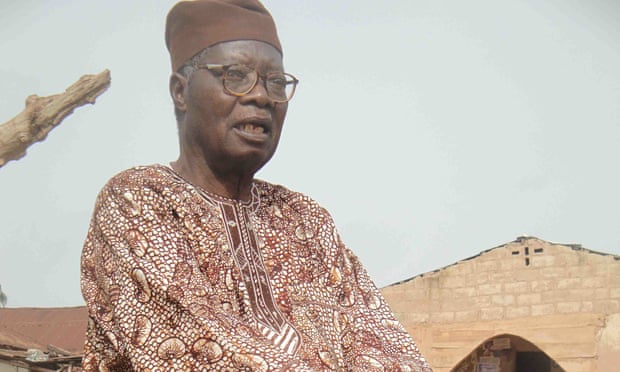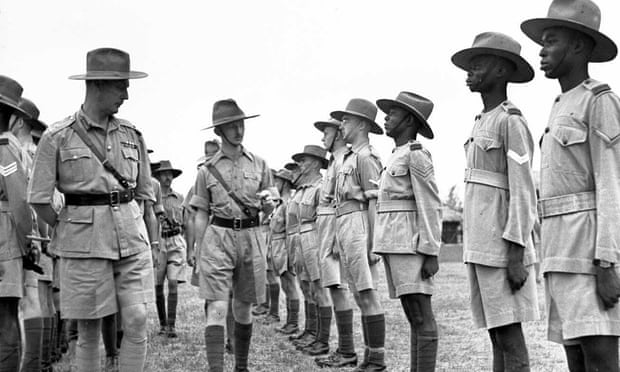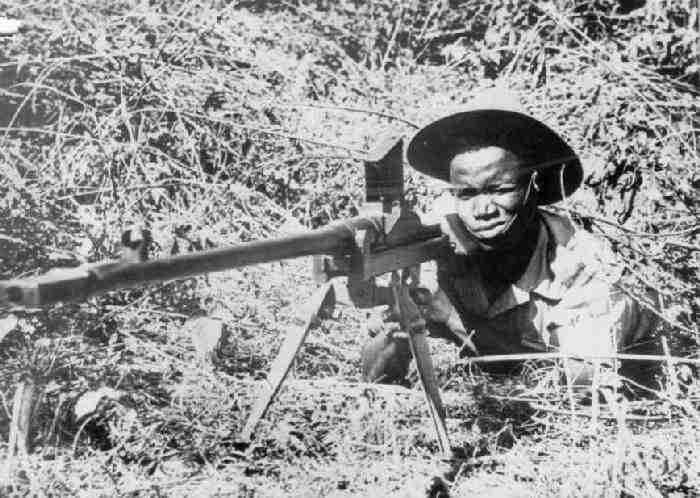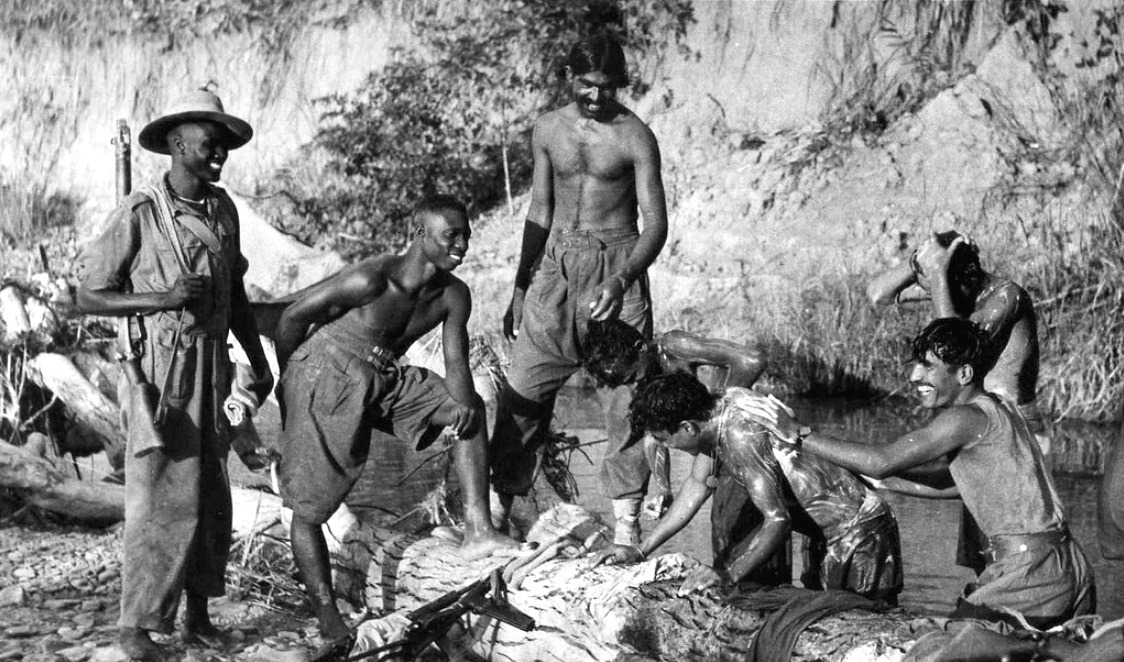The Forgotten Army Of WWII: West Africa’s Soldiers In Burma - Politics - Nairaland
Nairaland Forum / Nairaland / General / Politics / The Forgotten Army Of WWII: West Africa’s Soldiers In Burma (4494 Views)
Military Raid: Israel Okwu Kanu Petitions UN, UK. Accuses Army Of Looting / Soldiers In Show Of Super Human Strength At An Event (Photos) / The Forgotten Army Of WWII (2) (3) (4)
| The Forgotten Army Of WWII: West Africa’s Soldiers In Burma by bukster(f): 8:08pm On Aug 16, 2015 |
 [size=5pt]Isaac Fadoyebo in his home village in Nigeria in 2011, the year before his death. Photograph: Barnaby Phillips[/size] A few months before he was shot as an enemy soldier in its sweltering jungles, 16-year-old Nigerian Isaac Fadoyebo had never even heard of Burma. The journey that led him there began in a fit of youthful exuberance when he ran away from his village in south-western Nigeria and signed up to fight for Britain in the second world war. He joined an estimated 100,000 others from Britain’s colonies of Gambia, Ghana and Sierra Leone who sailed from west Africa’s creek-lined coast around the Cape of Good Hope, then onwards to Burma. There, Japanese soldiers ambushed his platoon and Isaac was left for dead behind enemy lines. What happened next captures not just the personal bravery of one man and the strangers into whose midst he was catapulted, but shines a light on a forgotten front of the war. The ripple effects of the south-east Asian conflict radiated from Burma’s Rohingya Muslim minority, whose persecution today is a direct legacy of the war, to the returning west African soldiers who later started the region’s march towards independence. Alongside Nigeria’s own inability to remember its war dead, it’s also a story of Britain’s often-neglected debt to its colonial soldiers, and how two British men helped to resuscitate that legacy. Even in Britain, the 81st and 82nd divisions – the Allies’ west African force – were known as the “forgotten army” as all eyes became fixed on the threat of Nazism much closer to home. The eight in 10 west Africans in those divisions in Burma were a forgotten contingent within the forgotten army. Now Fadoyebo was to become one of its dead. It was monsoon season in Burma, a time of mosquito-filled heat and lashing rains. Too weak to move, he lay bleeding in the tropical forest 6,000 miles from home and waited for the end. Seventy years after the event, there’s still disbelief about a remarkable chapter in Nigeria’s history. “But for my grandfather being involved, I never would have been able to put into perspective the fact that Nigeria was in the war,” said Fadoyebo’s grandson, Ayo, a human resources worker in Lagos. “I knew Nigerians fought, but it was so distant I couldn’t place how it affected me as a Nigerian.” It was a feeling common even at the time. In countless villages such as the sleepy hilltop one of Owo, where Fadoyebo lived, the bloodshed had been a distant thing rumbling on in remote lands. There were vague rumours that Hitler wanted to invade Nigeria itself, to plunder its mineral wealth. But the tentacles of the far-flung battles reached Owo when a recruitment truck rolled into the bushes in December 1941. Among the curious onlookers was Fadoyebo, a tall, well-built teenager. The colonial officer’s exhortations to fight for the empire didn’t rouse him; instead, he sensed a chance to escape the sleepy backwater, earn money and see the world. Fadoyebo’s tale from there might have been lost to history were it not for the efforts of British journalist Barnaby Phillips, who chronicled the astonishing story that was about to unfold in his lucid, exquisitely detailed book Another Man’s War. In 2011, Phillips took time off from working in Athens and began researching the “Burma Boys” in London’s Imperial War Museum. The addition of east African recruits swelled Britain’s colonial army to a 500,000-strong force. But Phillips noticed something rare when he began reading the available literature. Buried in the hundreds of books, he chanced upon a slim novel by a man called Isaac Fadoyebo. “It was called A Stroke of Unbelievable Luck and was a beautiful, 70-page manuscript by a Nigerian who not only survived an extraordinary experience, but put it all down in writing,” Phillips said, still sounding amazed at his own good fortune. That was down to David Killingray, an English professor specialising in imperial history. He’d received the handwritten manuscript – Fadoyebo’s only one – in 1989. “I immediately realised this was extraordinary, and set about getting it published,” he said. Several hundred copies languished in a handful of academic and military libraries for years. Fadoyebo’s story began on the morning of 2 March 1944, when his platoon was eating breakfast on a steep bank of Burma’s Kaladan river. Suddenly they came under ferocious attack from the Japanese, who were expertly trained in jungle warfare. Men fell around Fadoyebo and a bullet pierced his thigh. He dropped down in anguish. “He knew what was coming. The Japanese, take a prisoner? A white man, like Captain Brown, perhaps, but a black man? No chance,” Phillips writes in an opening that transports readers viscerally to the scene. The final shots never came, perhaps because the Japanese believed he would succumb to his wounds. Another soldier, David Kagbo, was also wounded in the field. Fadoyebo crawled to him, and they waited together as death stalked them.  Recruitment of Nigerian troops in 1943. Photograph: Courtesy of Jill Hopwood But the rustling in the reeds turned out to be villagers bringing food. Isaac’s stroke of unbelievable luck was going down in a village of Bengali Muslims, known as Rohingya, who sided with the British. For weeks, they brought sustenance, sometimes every other day, sometimes longer if fighting was particularly fierce. Eventually, a farmer named Shuyiman helped the two men limp to his home. There, at risk of death, he sheltered the two strangers until British forces broke through again in December. Their rescuers knew them only by Muslim names they adopted in deference to the villagers: Isaac was Suleman and David was Dauda. Fadoyebo never forgot his saviours. “God sent them to save me,” he would always say later. “He had an unquantifiable desire to know what had happened to Shuyiman’s family. He talked about them all the time,” Ayo said. A call from a stranger six decades later proved to be another stroke of good fortune. After chancing on his memoirs, Phillips had spent weeks in an effort to track down Fadoyebo. “I was so worried. I thought he wouldn’t be able to understand me, he’d be deaf, he wouldn’t be able to catch my English over the phone,” he said, explaining the moment he finally found a working phone number for Fadoyebo. “I gave this long speech about who I was, what I wanted to do and so on.” There was a long pause on the other end. Then a deep voice replied: “Mr Phillips, when are you coming to Nigeria?” That began a friendship between the two until, moved by his friend’s pleas, Phillips journeyed to Burma in hope of finding Shuyiman’s family and passing on the thanks the veteran had longed to give for decades. It’s difficult not to worry about how quickly history can fade in Nigeria. Official western accounts long played down the contribution of Africans in the Asian campaign – allied commander General Slim never thanked the 14th Army, of which they were part – and few young Nigerians know of it. “As children we didn’t go to the village very often; if we had we would have known about it,” said Ayo, who said his grandfather never talked about his wartime experiences until the call from Phillips. During an extended visit to the village in 2002, a cousin introduced Ayo to everyone by declaring: “This is the grandson of Baba Solja [Old Soldier].” “As soon as he said that, no further explanation was needed. It was established who I was,” Ayo said. Nigeria’s military still has 81st and 82nd divisions in honour of the veterans, but celebrations of VJ Day are invariably muted. “We celebrate second world war veterans at every opportunity. Just like any other Nigerian soldier who dies serving, their children have been awarded scholarships and other welfare packages,” said spokesperson Rabe Abubakar. Next to the neatly manicured second world war graves in a cemetery partly maintained by the Commonwealth War Graves Commission in downtown Lagos are the litter-strewn, unkempt grounds that house the government-run memorials for Nigerian peacekeepers in the 1990s. At least one man’s memories were properly looked after. In a documentary he made later, Phillips travels across wide expanses of jewel-green fields dotted with crumbling temples in Burma’s Rakhine state. It’s a risky journey, given the turmoil affecting Rohingya Muslims there, and there’s every chance that the village where Fadoyebo was rescued has been razed. Phillips eventually finds the right location – the story of the two African men is part of local folklore. Watched by chattering monkeys, Shuyiman’s family struggle to hold back tears as he delivers Fadoyebo’s letter. “His real name is Isaac Fadoyebo and he wants you to know he thinks of your mother and father and sister every day,” Phillips begins, himself tearful. Photographs of Fadoyebo are passed round. The women clutch them to their chests. One man blinks furiously. Another woman covers her hand with her face and sobs. “We’ve thought of him for so long,” she says, wiping her eyes with her headscarf. Being able to thank those who sheltered him meant Fadoyebo was at peace even when old age sent him to hospital in 2013. Incapacitated in bed, he discussed attending his grandson’s wedding when he got better, and picking up a wartime medal that the government had promised. “I’m fine, don’t worry. I’ll pick up the medal when I’m out of the hospital,” he told Ayo just before he died on 9 September. Two days later, the medal that had been 68 years in coming finally arrived. https://www.youtube.com/watch?v=DWIHOIZVZtE some images from the youtube clip             |
| Re: The Forgotten Army Of WWII: West Africa’s Soldiers In Burma by Nobody: 8:24pm On Aug 16, 2015 |
k |
| Re: The Forgotten Army Of WWII: West Africa’s Soldiers In Burma by ibe9ja: 8:27pm On Aug 16, 2015 |
Ok |
| Re: The Forgotten Army Of WWII: West Africa’s Soldiers In Burma by patwilly(m): 10:52pm On Aug 16, 2015 |
my mums uncle fought in this war and came back Too bad he died before I was old enough to ask him questions. 1 Like |
| Re: The Forgotten Army Of WWII: West Africa’s Soldiers In Burma by patwilly(m): 10:59pm On Aug 16, 2015 |
President Buhari in an interview before he became president said Gen. Hassan Usman Katsina's grand father, an emir, left his position as emir of Katsina and fought as a soldier in Burma. He died there. He was quite young and loved adventure he said. Gen Katsina was one time Nigerian Chief of Army Staff and military Governor of then Northern Region. He died in 1997. |
| Re: The Forgotten Army Of WWII: West Africa’s Soldiers In Burma by bukster(f): 5:00pm On Aug 17, 2015 |
More pictures [img]https://blackfilmcenterarchive.files./2012/10/burma-boy-map.jpg[/img] trip from Nigeria to Burma  East African Division  Battlefield on Scraggy Hill at Shenam [img]http://archived.thisisafrica.me/data/thumb/abc_media_image/7000/7542/w430.68de7.jpg[/img] Soldier training  Sierra Leonean recruit in 1943  Doctors tend to an inured soldier in an improvised operating theatre in 1944  Troops from the East African division on the road to Kalewa [img]https://upload.wikimedia.org/wikipedia/commons/0/0a/West_African_Chindits,_Operation_Thursday.jpg[/img] Troops of the Nigerian Regiment, 3rd West African Brigade (Thunder), boarding an RAF Dakota  Nigerian soldiers of the 81st (West Africa) Division and Indian soldiers of the Indian XV Corps bathe in a stream during the Burma Campaign.  |
| Re: The Forgotten Army Of WWII: West Africa’s Soldiers In Burma by Truckpusher(m): 2:53pm On Sep 13, 2015 |
Nice topic you got here and it didn't even get upto second page . How did I miss this thing. I've watched the documentary on Aljazeerah . My granpas from both sides fought in this war. I'll get their pictures....smh |
| Re: The Forgotten Army Of WWII: West Africa’s Soldiers In Burma by bukster(f): 7:22pm On Oct 18, 2015 |
Truckpusher:Yes it's sad that barely anymone has bothered to read or post on this thread even though it is very informative. |
| Re: The Forgotten Army Of WWII: West Africa’s Soldiers In Burma by Crocz(m): 8:06pm On Oct 18, 2015 |
War doesn't yield anything good, only death and destruction. Fighting another man's war?..dying to save the country whose fore-fathers came to loot dry of anything good in your own country?...they probably don't know any better. I'll be damned to fight another man's war! 1 Like |
| Re: The Forgotten Army Of WWII: West Africa’s Soldiers In Burma by Vado(m): 8:36pm On Oct 18, 2015 |
Informative. |
| Re: The Forgotten Army Of WWII: West Africa’s Soldiers In Burma by kjhova(m): 10:07am On Mar 18, 2017 |
@lalasticlala, @mynd44, @seun; Guys, I know this post is a bit dated however you need to assist to push it to front page for the national historical importance of the topic. Thank you |
| Re: The Forgotten Army Of WWII: West Africa’s Soldiers In Burma by MrHighSea: 2:26pm On Feb 18, 2018 |
Of recent, I've had the thirst for war history. I ask myself questions, then google the answers. What led to wwII? How was Hitler so successful in the first rwo years of intensed offensives? Where was mother Russia, China and USA? During wwII, we still had civil war within some countries? CHAOS But the war strategists were men of high IQ and fibrous heart. In my quest to factor in Nigeria into the wwII, I landed here. Our men did relatively well and brave. We were not cowards. Bravery in the face of the enemy |
| Re: The Forgotten Army Of WWII: West Africa’s Soldiers In Burma by pafo(m): 11:02am On Jul 16, 2018 |
I was looking for Nigeria’s role in wwII of which wiki gave no credit to us. After searching through web pages, I found a site that had pictures giving credit to nairaland. I was very sure the post would not have made front page just because of the nature of it. If it had been tonto dike bathing unclad, or davido in a private jet with chioma, it would make fp instantly but informative threads never get a sniff except it’s from explorers. Seun, talk to your mods. cc lalasticlala, dominique, mynd44. |
(1) (Reply)
One Biafra Coin To Be Auctioned For About N46,000 / Picture Of A Biafran Soilder Flogging A Villager In Midwest During Civil War / Victory At Last For Yorubas In PDP
(Go Up)
| Sections: politics (1) business autos (1) jobs (1) career education (1) romance computers phones travel sports fashion health religion celebs tv-movies music-radio literature webmasters programming techmarket Links: (1) (2) (3) (4) (5) (6) (7) (8) (9) (10) Nairaland - Copyright © 2005 - 2024 Oluwaseun Osewa. All rights reserved. See How To Advertise. 50 |